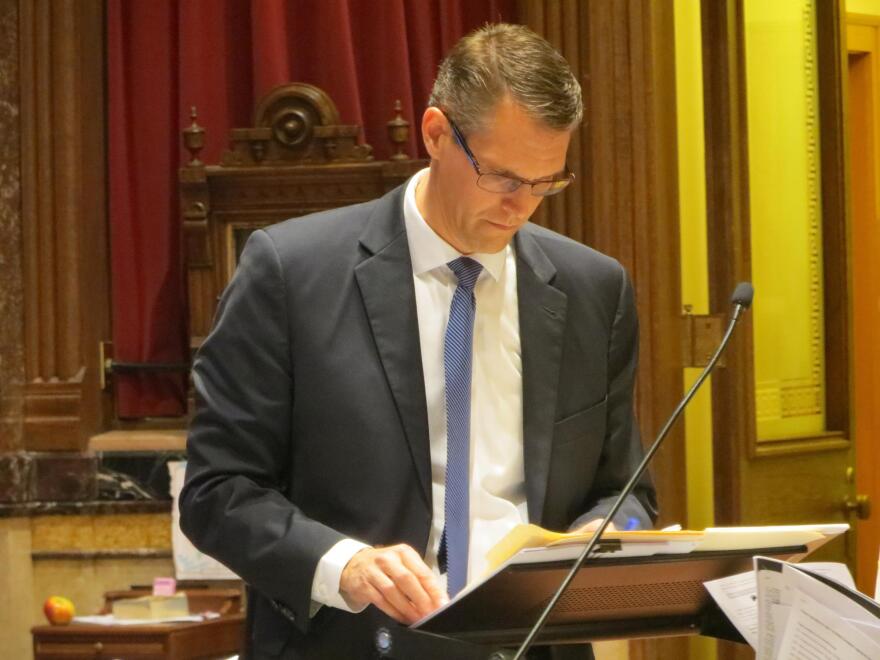The Republican-sponsored tax reform bill that passed on the last day of the legislative session included some tax advantages for private schools that didn’t get much attention during the debate. That was a victory for private K-12 education advocates, who lost a bigger battle this year. A bill to give state dollars directly to families for private and parochial school tuition, what advocates call education savings accounts and critics call school vouchers, failed to advance.
Since 1998, Iowans have been able to save money on their state and federal taxes by contributing to College Savings Iowa, administered through the office of State Treasurer Mike Fitzgerald.
“It’s been wildly popular,” Fitzgerald said. “We have over 250,000 accounts and over $5 billion saved for kids to go to college.”
"It's just trying to create good policy." -Sen. Randy Feenstra
Parents and grandparents can contribute to the funds. The interest grows free of federal and state capital gains tax. Plus Iowans receive a more than $3000 deduction on their income tax. Now, under the GOP’s tax reform bill, families can get the same tax breaks by saving for private K-12 tuition.
“We’re trying to push alternatives for people’s education, said Sen. Randy Feenstra, R-Hull, a chief architect of the tax bill. “It’s a discussion between the House and the Senate. We collectively said this is one way that we can help.”
Feenstra says the legislature followed the lead of the federal government, which added private K-12 schools to college savings plans in their giant end-of-the-year tax bill. The non-partisan Legislative Fiscal Bureau estimates that it will cost the Iowa treasury $5 million this year and $7.5 million every year after that.
"We manage to find this money I don't know where." -Rep. Sharon Steckman
Ranking minority member on the House Education Committee and leading public school advocate, Rep. Sharon Steckman, D-Mason City, is not pleased.
“You know how I feel about those things,” Steckman said with a rueful laugh. “One percent allowable growth and then we manage to find this money I don't know where.”
Steckman is referring to the 1 percent increase in basic state aid to public schools lawmakers approved for next year, which many public school advocates found inadequate. Steckman is also unhappy about another tax break for private schools tucked into the tax bill, an expansion of the School Tuition Organization tax credit, what Steckman calls one of the most generous tax breaks of all.
Under the program, Iowans can donate any amount to scholarships for private schools and receive a 65 percent credit on their state tax bill, as well as a federal tax deduction. That means some wealthy taxpayers can contribute to the scholarship funds and take nearly the entire amount off their taxes.
Iowa Advocates for Choice in Education Executive Director Trish Wilger is pleased that private K-12 schools will be able to participate in the college savings plans if the governor signs the bill.
“But it was not one of our top priorities this year,” Wilger said. “We see it as more of a tax reform initiative than school choice but it will definitely help some Iowa families and save them a little bit.”
Wilger says the change will mostly benefit families that can already afford private school tuition.
State Treasurer Fitzgerald explains how that would work.
“They could put the money in, let's say today, and come September 1st, pay your $5000 tuition, take it right out, and you got your tax deduction,” Fitzgerald said.
Some critics say the advantages for private schools that ended up in the tax bill, including breaks for saving for K-12 tuition, and expanding the school tuition tax credit, were a consolation for not getting the bigger prize, the education savings accounts, or vouchers.
“Those two things were put in so that educational savings accounts did not get acted on this year,” Steckman said.
But Senator Feenstra said both provisions were in the tax bills long before the discussion began on educational savings accounts.
“This had nothing to do with educational savings accounts,” Feenstra said. “It’s just trying to create good policy.”
Meanwhile, Trish Wilger says private school advocates hope the ESA’s will get approved next year.
“We’re optimistic but certainly part of that will be on what happens in November with the elections,” Wilger said. “We’ll wait and see what happens there and begin our strategy and efforts after that.”


